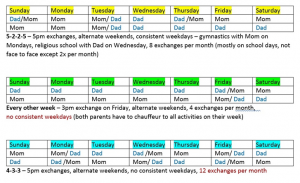The best way to transition to Shared Parenting after separation or divorce is to have been sharing parenting and housework all along – from the day the kids were born. When we establish a new cultural norm that both parents are involved in caring for the children, then the courts have no problem dividing time equally. Some of my clients have been married 2-5 years, some 10-20 years, some never married, and some same sex couples. What they have in common is they share kids whom they love.
When parents split up, the most important thing is that they shift their relationship from an intimate, romantic one to a more business-like relationship with the common goal of raising whole, healthy, happy children. Studies show that it is the intensity and duration of the conflict that is so harmful to children of divorce.
Parents are taking a more active role these days in deciding their parenting plans. Did you know there are many ways to slice’n’dice 50/50 and still call it equal?
Some parenting time schedules are more prone to conflict than others. One day ‘ping pongs’ such as in a typical non-custodial schedule of one night a week and every other weekend are particularly hard on children. Kids need some time to settle in when they go back and forth between one parent’s home and the other.
No one ever said it’s easy for kids to have two homes. Let’s not make it harder with these one day transitions in the schedule. Some parents split the school week with Mon/Tues for one parent and Wed/Thurs for the other and then alternate weekends.
We can learn from what other states are doing. I think Arizona has one of the best guides to appropriate parenting time schedules for different ages and stages of child development. https://www.azcourts.gov/portals/31/parentingTime/PPWguidelines.pdf
Toddlers and preschoolers do better with transitions every few days, school age kids may do well with a 5-2-2-5 schedule, while teens often prefer as few transitions as possible – preferably week on / week off if the parents live close enough to the child’s school to make that possible.
Even a simple change in dropoff time – like Sunday 4pm instead of 6pm can make things go a little easier. With a 6pm dropoff right in the middle of dinner, if the parent dropping off is late, that can create stress all around. 4pm allows a ‘cushion’ so that the transition can go more smoothly. It also gives the child time to settle in so meal time can be a more welcoming, less stressed time.
Some things to consider when deciding on a parenting plan:
1) Can the parents communicate with each other about the kids’ needs without conflict?
2) How close do the parents live to each other – within 5 miles, less than 20 miles, in another city or state?
3) How old are the kids? Toddlers may need different schedules than teens.
4) Where is the children’s school? Are all the children at the same school?
5) Do the parents work outside the home – days/nights/weekends? Does their work involve overnight travel to other cities or states?
6) Do any of the kids have special needs – behavior, learning, dietary, frequent medical care?
Here are some parenting time schedules to consider and some of the pros & cons.
PARENTING TIME EXAMPLES

It’s good to include some language in your decree that says you will revisit your parenting time schedule every 3-5 years as circumstances change – people move, change jobs, get into new relationships, and their kids mature so the schedule they agreed upon years ago may need some updating.
EHTC offers monthly co-parenting workshops. In these workshops we cover communication and conflict resolution skills and there’s plenty of time for talking about real-life co-parenting scenarios with other parents. These groups are ONLINE via Zoom so people can log in from anywhere!
For those who need more support than what is offered in these monthly workshops, parents can purchase individual coaching sessions (packages of 6, 12, or 20 sessions which expire one year from date of purchase).
Hopefully in the classes and coachings, parents gain the communication, conflict resolution, and stress management skills they need for resolving day to day challenges. When facing a bigger issue such as re-arranging a parenting schedule due to a move or job change, finding a care provider to address a child’s health challenge, or seeking help for a child struggling in school, consider mediation – a safe space where the parties are empowered to express what is deep in their hearts, really listen to what the other side is saying, and be open to considering options with a focus on what’s best for the child.
Adina Lebowitz, MA is a family mediator, parenting educator, and wellness  coach.
coach.
Adina’s primary goal is to help families find less stress and more peace in their co-parenting. She supports parents as they are adjusting to a new separation or divorce, and continues to support them as co-parents whether they are facing day to day parenting challenges, or dealing with the impacts of stress on their lives. She is available to mediate bigger issues that impact their parenting plans like a move, job change, new relationship, or a child’s health challenge.
In partnership with the Minnesota Shared Parenting Action Group #MNSPAG she encourages schools, worship congregations, doctors/dentists/therapists, and youth activity & sports directors to communicate schedules & appointments to BOTH parents. Sharing information goes a long way towards reducing conflict and enabling co-parents to find less stress and more peace. #kidsneedboth #doit4MNkids
Elan Health Twin Cities LLC (Minnetonka, MN)
612-499-8418
adina@elanhealthtc.org
www.elanhealthtc.org/mediation



